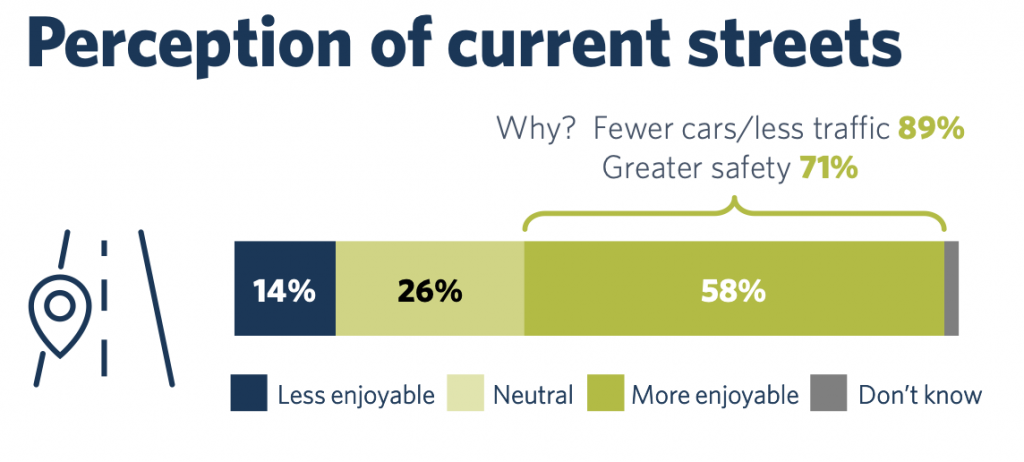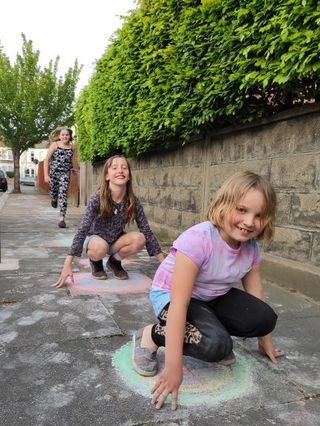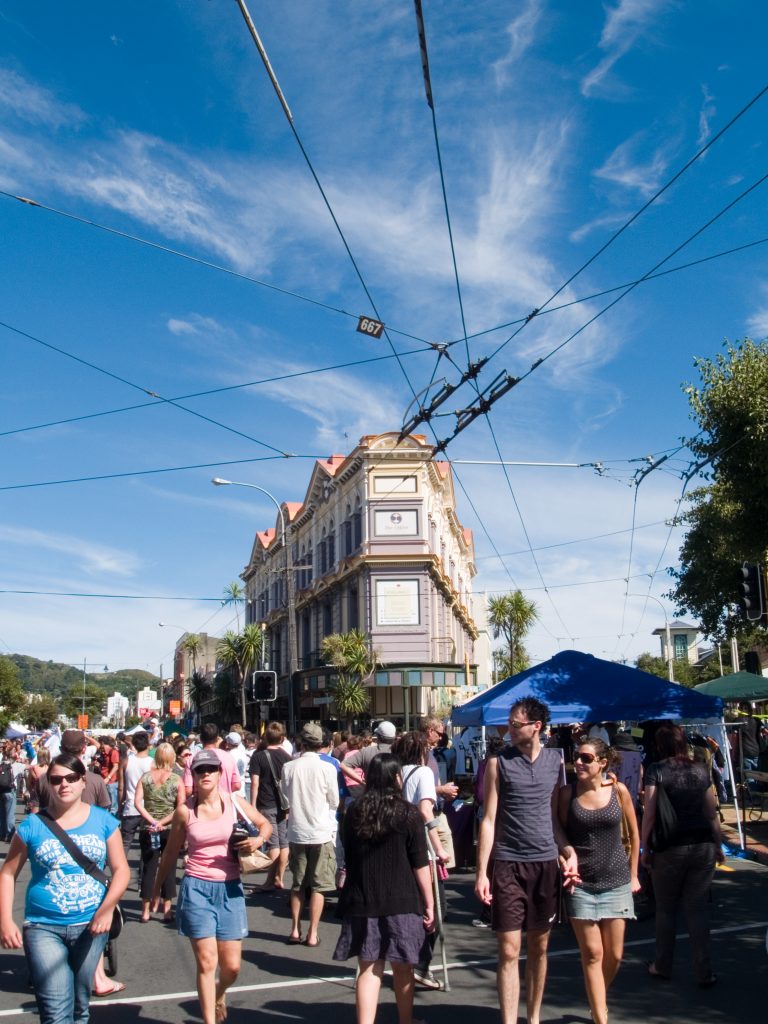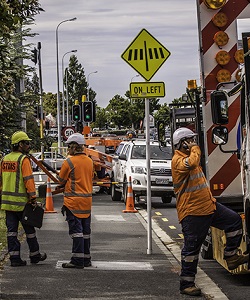Play streets are magic, paperwork is not
Play streets: a wonderful way to foster play and community resilience. Road closures for play streets: Really flipping hard!
Playing in the street, an ancient pastime afforded to the children of the past, but not usually the children of the present. Roads have been claimed for cars, cars, and everything else relegated to the edges.
Except when our cars were parked up while we worked and learnt from home during that remarkable period of lockdown.

Suddenly Berhampore local Mark Johnston noticed kids were playing out in his street. Running and wheeling about, free as a bird, while an adult kept an eye out for traffic at the end of the street. It seemed so simple “I thought that’s something that people could do with their street really any weekend, any weekend morning, just have parents or responsible adults standing at the end of the street, looking for any vehicles.”

Full of community spirit, and wanting to be fully above-board, Mark reached out to the council to run it past them, only to find that if he wanted to officially close his quiet residential cul-de-sac for one day of play, he’d have to follow effectively the same process as if he wanted to close a major arterial road like Taranaki St or Adelaide Road: formal notices in the newspaper 40 days in advance, thousands of dollars of getting a professionally-done traffic management plan, and certified people putting out cones and a host of warning signs. Think Newtown Festival, Around the Bays.


All that hi-vis for a little cul-de-sac, “so yeah, I was a bit dissuaded by that” Mark said, “I just thought the process was a bit overkill”. He was told by council that they weren’t prepared for the play street to go ahead without a professional traffic management team. “I’ve heard ballpark figures of between $2,000-10,000 to do that kind of [road closure] … it’s inaccessible to people who just want to do a community thing for their street”
Mark also noted that another barrier people are dissuaded by is expected push back from residents. People expect that there will be disapproval of the idea from residents, so they don’t even try. After all, it’s curtailing people’s accustomed “right” to drive and park on the street”.
However, Mark found the total opposite. “We sent a letter to the people in the street, saying if you have any objections please get in touch and we can talk about any concerns you have. We only had three responses, and they were all positive, just saying yes please do this, there’s no problems, it’s fine.” Hooray!
Mark reached out to some contacts within Waka Kotahi to express his concerns about the barriers to putting on these events. They informed him that they were reaching out to councils to try and make the process easier across the country.
It’s a bit tricky because councils technically have jurisdiction over pretty much anything that isn’t a state highway. However, they’re limited by the Land Transport Act 1998, of which Waka Kotahi is the legislative guardian and creator of the rules and regulations that fall under it. Because Waka Kotahi is usually thinking about their state highways, those car-centric management tools tend to slip into the legislation urban councils have to follow. And the way they’ve been told to keep people is safe, is keeping them away from cars. This lumps the most vulnerable travellers (people not in cars) with the responsibility of keeping themselves out of harm’s way, and not the ones with the potential to cause the harm (people in cars).
Because of all that, having play streets be a regular thing will require a lot of work (and pestering from good folks like yourself) inside both Waka Kotahi, and councils. But it sounds like the wheels have been set in motion, so all that’s needed is some continued momentum.
Why bother?
Parents (and health experts) have been calling for safer streets that give kids spaces to play for quite a while. People have also been calling for lower carbon communities, with more community spirit. Fortunately, play streets are magic and help us further all these kaupapa. Once you see a kid grinning ear to ear running down the street, it’s a lot harder to be grumpy about having to park 100m down the road, and a lot easier to imagine the benefits of a lower traffic street.
Mark is in the non-parent category, but could see the time pressures facing parents. He knew many of them didn’t have the time or energy to fight these battles, so stepped up to help get this event happening for his community.
When asked why he bothered with all the hassle, he waxed lyrical about the importance of play, which is reason enough, but he also discussed even bigger reasons.
- It helps fulfill the Berhampore Community Association’s goals of improving community engagement
- It helps build community resilience so that the community can come together when it really matters, such as during natural disasters.
- Events like these can also work to reduce isolation in the community.

Why not just, you know, do it?
Although many people have questioned why they didn’t just run the event unofficially, as parents did over lockdown, Mark was steadfast. “We’re doing this because we believe we can make a process that this council and other councils can follow”. Mark hopes that after this event and the work of Waka Kotahi, the council will make the process much easier for other communities wanting to organise tākaro play streets, and even encourage them. He’d also like to see a tiered system created for road closures so low traffic small suburban streets don’t require the same admin as major arterial route closures.
Thanks to Mark and his community’s tenacity, the event is set to go ahead, and WCC even agreed to engage Fulton Hogan free of charge to manage traffic. Mark said “We just want to make sure residents are happy with the event, and the residents want us to do it again in future”
“It seems to be that we’ve let the cars take over. If cars are in a certain place then it’s not a place for play, it’s a place for cars … [This is] about accessing those little opportunities to play, in the spaces that we live”
Ka rawe koutou Mark and his tākaro play streets team!
Further reading:
Let’s get out and play!
A great UK organisation doing the same thing
Image Credits:
Cover image: Kent Lundberg
Lockdown streets survey: Women in Urbanism
Leapfrog chalk: Londonplay.org
Newtown Festival: Rebecca Cox
Traffic Management: T8 Traffic Control
Families on bikes: Jolisa Gracewood
Hi, I am interested in starting one of these in Highbury, any chance I could get in touch with the author to discuss any progress on this in Wellington?
Hi Bill! Great to hear. Sorry to miss this and only catch it months later. Best place to start for setting something up is probably WCC’s Transport team and Play team – perhaps Peta McMillan (Play lead) and Paul Barker (the street transformation manager). If no luck / no response there you could try someone like Sandy Mandic or Claire Pascoe who aren’t quite the right people but would undoubtedly help point you to who is.
This piece quotes both the first people and Kate Hodgetts too https://wellington.govt.nz/news-and-events/news-and-information/our-wellington/2021/02/berhampore-play-day
Good luck for Highbury!